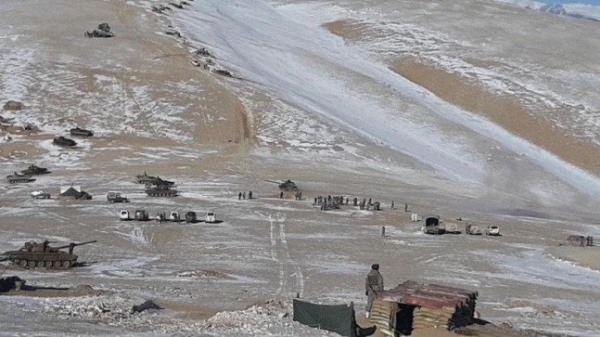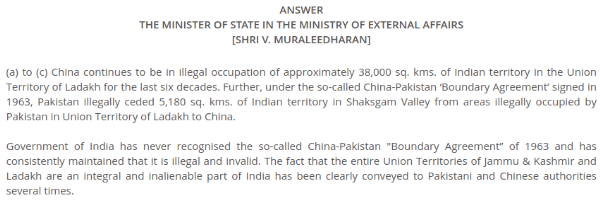China continues to illegally occupy approximately 38,000 sq km of Indian territory
05 Feb 2022 10:38:46
New Delhi, Feb 5: In a major revelation, China continues to be in illegal occupation of approximately 38,000 sq. kms. of Indian territory in the Union Territory of Ladakh for the last six decades, Minister of State for External Affairs V Muraleedharan informed Lok Sabha.

Further, under the so-called China-Pakistan 'Boundary Agreement' signed in 1963, Pakistan illegally ceded 5,180 sq. kms. of Indian territory in Shaksgam Valley from areas illegally occupied by Pakistan in Union Territory of Ladakh to China, the minister said in a written reply to a question.

This statement came after the minister was replying to a question of Bahujan Samaj Party MP Shyam Yadav Singh. Muraleedharan said, "Government of India has never recognised the so-called China-Pakistan 'Boundary Agreement' of 1963 and has consistently maintained that it is illegal and invalid."
"The fact that the entire Union Territories of Jammu & Kashmir and Ladakh are an integral and inalienable part of India has been clearly conveyed to Pakistani and Chinese authorities several times," the MoS said.
Also Read: 'China has politicized Winter Olympics': Indian diplomats to boycott Olympics over China’s torchbearer
After the 1962 conflict, both China and Pakistan saw an opportunity to strengthen and develop their relations to put strategic pressure on India. As part of that bargain in 1963 agreement between China and Pakistan was signed, even though there is no border between the two countries. Moreover, it was ceded to China by Pakistan.
Later, Chinese President Xi Jinping announced the China Pakistan Economic Corridor (CPEC) in 2013, making further use of the illegal connections between China and Pakistan to consolidate their bilateral ties including Shaksgam Valley to China in 1963. India has continuously opposed the Belt and Road Initiative (BRI) and CPEC as a violation of sovereignty right from 2013 onwards.
To a separate question, Muraleedharan said the government has taken note of a bridge being constructed by China on Pangong lake.
“This bridge is being constructed in areas that have continued to be under the illegal occupation of China since 1962,” he said. “Government of India has never accepted this illegal occupation. The government has made it clear on several occasions that the Union Territories of Jammu and Kashmir and Ladakh are an integral part of India and we expect other countries to respect India’s sovereignty and territorial integrity,” he added.
About the eastern Ladakh border standoff, Muraleedharan, India and China have maintained dialogue through both diplomatic and military channels for disengagement in the remaining areas.
“Our approach in these talks has been and will continue to be guided by three key principles, that, (i) both sides should strictly respect and observe the LAC (ii) neither side should attempt to alter the status quo unilaterally; and (iii) all agreements between the two sides must be fully abided by in their entirety,” he said.
“This bridge is being constructed in areas that have continued to be under the illegal occupation of China since 1962,” he said. “Government of India has never accepted this illegal occupation. The government has made it clear on several occasions that the Union Territories of Jammu and Kashmir and Ladakh are an integral part of India and we expect other countries to respect India’s sovereignty and territorial integrity,” he added.
About the eastern Ladakh border standoff, Muraleedharan, India and China have maintained dialogue through both diplomatic and military channels for disengagement in the remaining areas.
“Our approach in these talks has been and will continue to be guided by three key principles, that, (i) both sides should strictly respect and observe the LAC (ii) neither side should attempt to alter the status quo unilaterally; and (iii) all agreements between the two sides must be fully abided by in their entirety,” he said.
Also Read: At least 38 PLA soldiers lost their life instead of 4: New report on Galwan valley clash
Muraleedharan said the last round of talks between the senior commanders of India and China was held on January 12 and they agreed that both sides should follow the guidance provided by their leaders and work for the resolution of the remaining issues at the earliest as this would help in the restoration of peace and tranquillity in the region and enable progress in bilateral ties.
He also said that the government has noted reports of renaming of some places by China in the Indian state of Arunachal Pradesh. “This is a futile exercise that will not alter the fact that Arunachal Pradesh has always been, is and will always be an integral part of India,” he said.
The minister said the government gives careful and specific attention to the improvement of infrastructure for the development of border areas, in order to facilitate the economic development of these areas and also to meet India’s strategic and security requirements.
“The government also keeps a constant watch on all developments having a bearing on India’s security and takes all necessary steps to ensure that our security interests are fully protected,” he said.